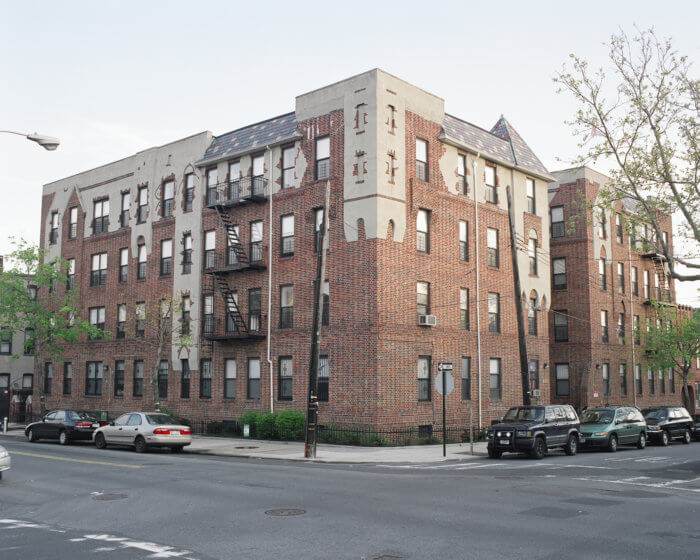Brooklyn-based nonprofit RiseBoro Community Partnership has reached a settlement with private equity giant Blackstone and will take majority ownership of three affordable housing developments after a lengthy legal battle.
The settlement will allow RiseBoro to keep 190 units affordable long-term, and represents a possible turning of the tides in what has been a difficult fight against predatory private equity firms.
RiseBoro, SunAmerica and Blackstone
In 1999, RiseBoro entered a 15-year agreement with SunAmerica, a subsidiary of finance and insurance corporation AIG, to renovate a new affordable housing development at 420 Stockholm St. in Bushwick under the federal Low Income Housing Tax Credit program.
Following the provisions of that program, SunAmerica took majority ownership of the building, said RiseBoro CEO Scott Short, and provided the capital for RiseBoro to renovate and received significant tax breaks in return. After 15 years, Riseboro tried to trigger their Right of First Refusal to purchase the building below market rate — also a provision of the LIHTC.
But SunAmerica refused to give up the building, and, when RiseBoro took them to court in 2018, a federal judge ruled in the company’s favor, throwing the terms of the ROFR into question. After RiseBoro brought the case to a federal Court of Appeals, Blackstone purchased a number of AIG’s assets, including Stockholm Manor and two other developments managed by RiseBoro, and things changed.
“They reached out to us even before the sale was consummated and came out and met with me and said ‘We’re making this big investment into affordable housing, it’s our first foray into the field and we really want to be a true partner and work with you guys and try to find a solution on this property, the other two properties we had done with AIG,’” Short said.
He was skeptical at first, he said, not sure why a private equity firm was taking an interest in RiseBoro and the buildings since they don’t present much opportunity for profit.

In 2019, the United Nations accused private equity firms — including Blackstone — of worsening the global housing shortage by inflating rents and aggressively evicting tenants. Blackstone strongly denied the accusations.
But Short was reassured by conversations with April Housing, the newly-formed, affordable housing focused Blackstone subsidiary who took over the RiseBoro deal, and said the company was trying in earnest to operate differently than AIG had.
RiseBoro now has a majority share of Stockholm Manor and two other affordable housing developments previously under LIHTC agreements, Renaissance Estates and Rheingold Gardens, both in Bushwick. Neither were part of the original lawsuit, but Blackstone wanted to come to a solution on all three properties, Short said.
The terms of the deal are set in stone and cannot change unless RiseBoro wants them to, Short said, and the nonprofit wouldn’t seek to change anything unless it would directly benefit the developments and the tenants.
“We are thrilled to reach an agreement with RiseBoro that will allow us to further our shared mission of preserving affordable housing,” said April Housing CEO Alice Carr, in a statement. “We greatly value the expertise and dedication of the RiseBoro team, and we welcome the opportunity to provide them with resources to enhance their exceptional resident services program as we continue to work together to support residents and local communities.”
Blackstone will also donate $1.2 million to RiseBoro’s supportive services over the next 15 years. The equity firm feels that one of the keys to keeping affordable housing affordable in the long term is supportive services, Short said, which were offered at some RiseBoro properties but not at Stockholm, Renaissance and Rheingold.
“There is a crisis management component, if a client is facing a crisis, the death of a family member or an illness in the family or loss of employment or a sudden expense turns their finances upside down, we can connect them to resources to help them overcome that crisis,” Short explained.
After a crisis has passed, RiseBoro offers financial and job coaching and other long-term services to help tenants remain stable and housed.
Public-private partnerships and the LIHTC
Despite the issues with SunAmerica and a rising number of private partners trying to maintain ownership of the affordable housing developments they help fund, Short said the LIHTC is one of the most successful government-sponsored public-private partnerships of the last 40 years.
“The end result is the creation of a really good social good, which is more affordable housing,” he explained. “The tax credit program is as close to 100% policy success as you’re going to find in terms of public-private partnerships that government has incentivized.”
Nonprofits often need capital funding and don’t benefit from tax breaks because they don’t pay income taxes, Short said, so the arrangement is a win-win, and is more effective than other methods the government uses to encourage private entities to fund affordable housing.
“When you start to look at things like 421-a and the cost per unit of the affordable housing that was created under that program 20 years, I think you would have to say that that’s a failure,” he said. “That’s a situation where you don’t want to continue to invest in an expensive program that produces so little affordable housing.”

According to city data, Bushwick residents are at fairly high risk of displacement — residential property prices and rents are rising more quickly there than they are on average citywide, about 30% of residents are considered “very low income” by the U.S. Department of Housing and Urban Development, and there are relatively few rent-stabilized units.
The neighborhood has also seen its share of shady developers skirting affordable housing demands — in 2017, the then-developer of the infamous Rheingold Rezoning sold the lot to two new developers, who refused to abide by an informal agreement to build more than the minimum number of affordable units required by law.
Late last year, construction began on Rheingold Senior Residences, an all-affordable development for seniors and the only surviving part of the original rezoning agreement.
RiseBoro received two new LIHTC awards last year, according to city records, including one for a partnership with the St. Nicks Alliance to build 28 affordable units across three new buildings in Bushwick, funded by the Local Initiatives Support Corporation.
The future of affordable housing under and Low Income Housing Tax Credits
Short is hopeful that the success of RiseBoro’s case — and similar cases decided in favor of nonprofits — will increase public knowledge of LIHTC and turn the tide against unsavory private investors.
“I think that the way that these kind of bottom-feeder investors have been able to achieve early success with these tactics is because it’s such an obscure technical issue,” he said. “It’s really hard for courts to understand how this impacts the public interest, and how this actually threatens affordable housing, and how this undermines signifiant investments that the public has made in these projects through tax credits and other subsidies.”
A boon in RiseBoro’s case was the involvement of New York Attorney General Leticia James, who advocated for the nonprofit and said that the case could have national implications.
“We had a lot of allies on our side, I think probably none more impactful than the AG,” Short said. “But we also had national players in this industry, we had the city law department, we had tax credit investors themselves who were not liking the way that certain investors were approaching this because it was giving investors a bad name.”
In addition, Short said, it would be fairly easy for the federal government to clarify that nonprofits unilaterally have the right to trigger the Right of First Refusal under LIHTC agreements. A provision that would have done just that made it almost all the way to passage as part of the American Rescue Plan, but was scrapped before the package was passed.
“We’ve talked to [Chuck] Schumer about this issue a number of times, we’ve talked to our local congressmember Nydia Velázquez, they’re both big supporters of this legislative fix,” Short said.

























